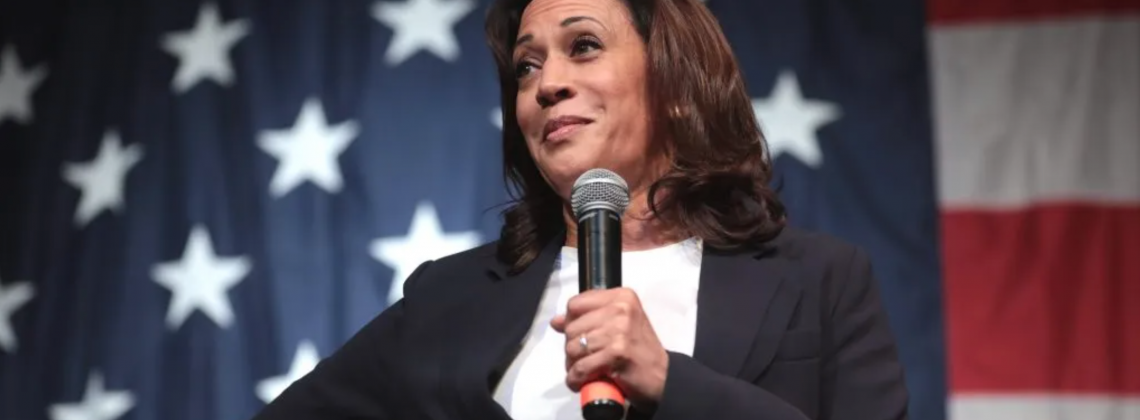

Something’s wrong with the Democrats—and it’s not quite déjà vu
We’re all familiar with the eerie—the disturbing feeling that what we’re looking at is not quite right, while others tell you everything is fine. Some recent horror movies have represented this encounter to sublime effect. In one of my recent favorites, Ari Aster’s Midsommar, a graduate student takes his friends to his Swedish commune’s midsummer festival. After a bad mushroom trip and other peculiar interactions, the eerie culminates in the ritual suicide of two elders. The visitors try to stop the ceremony, but their protests fall on incredulous ears. The eeriness persists when a leader implores them to see reason—this is a time-honored tradition, one the now-dead elders took great joy in. Their life cycle came to an end, and their sacrifices are the next step in the renewal and continuation of the commune. Things devolve from there.
This is a pretty compelling metaphor for contemporary American life. We’re watching a lot of people die—more recently from COVID and extrajudicial murder by militarized police, more historically from preventable (or at least treatable) diseases, homelessness, and deaths of despair. But it’s not the death that is eerie. It’s tragic, but the eerie doesn’t come until later: when our protests fall on incredulous ears and our leaders seem either unequipped or unwilling to do anything at all.
Many of those in power tell us that all this death is just part of life in the Land of Opportunity. Freedom never comes without sacrifice, they reason, and you wouldn’t want to live in another country, would you? They invoke Venezuela and Cuba—countries with fewer TV channels and brands of bread than the U.S.—obscuring the fact that they’ve been crippled with U.S. sanctions for the better part of the last century.
Then there are some lawmakers who at least admit that (1) there are problems and that (2) something should be done. But they either offer business-as-usual solutions of means-tested austerity (i.e. Kamala’s confusing Pell Grant proposal), or they play one crisis against the other to excuse themselves from doing their jobs. They say: Medicare for All? Forgiving student debt? We’d love to do those things. But what about Donald Trump? What about COVID? Democracy is in jeopardy! People are unvaccinated! We can’t destabilize things more than they already are by changing course with new policy. You want us—the ones with power, the ones who promised to do something—to do something? Now? Really?”
And when we waver on our support, their failures become our fault: “If you don’t re-elect us—the ones who at least acknowledge the problems—then you’ll just be turning power over to the bad guys, the guys who really don’t care about the poor, about racial injustice, about the climate. If you were truly committed to the difficult, slow work of democracy, you would keep voting for us. If you don’t, you’re just a cynic.”
It’s convincing. But what’s more cynical? This manipulation of our desire for a better world to maintain power without producing results? Or accurately describing the establishment’s routine failure to maintain their promises? The former is considered smart politics, the latter a distraction.
This is the eerie. The not-quite-deja-vu feeling that something is very wrong while being told that everything is fine. Mark Fisher, the late cultural theorist, describes the eerie as the feeling that there is something where there should be nothing, or nothing where there should be something. With the Democratic Party, the eeriness is of the latter category. Where there should be something—real opposition, sustained effort towards a specific, political goal—there is nothing. Only unkept promises, empty slogans, and never-ending spectacle.
This is, of course, nothing new. Throughout his first campaign and his presidency, Obama promised fundamental change on how private corporations influence elections. But then he let a Citibank executive pick his cabinet and bailed out the banks. He went into negotiations over the ACA hoping to come to a “bipartisan” solution when he didn’t even need one to get it passed. He admitted that we “tortured some folks” but still supported the CIA director who oversaw it. He turned the War on Terror into a muddled, technocratic, CIA-driven effort, increasing drone strikes tenfold. Yet somehow Obama was able to rebrand the Democratic Party’s neoliberalism as a new kind of patriotism founded in nuanced, moral seriousness, allowing the sentiment “Don’t let the perfect be the enemy of the good” to become the catch-all response to any criticism leveled against his and his party’s efforts.
The Reconciliation Bill is shaping up much like most Obama-era policies. The Democrats have all the power, yet their plans keep evaporating into thin air. Paid family leave is gone. Free community college is gone. Clean Energy Performance Program is gone. Half-measures though they were, they actually would have helped some people. But why are they gone? Many blame Joe Manchin, who has historically knee-capped most of the party’s progressive policies. But Manchin’s continued ability to bring the entirety of his party to heel forces a question: Who really has the power?
Let’s consider how things work on the Republican side. When was the last time a Republican president allowed a single congressperson to influence their agenda? When was the last time the Republicans ever stalled a policy, even when they were trying to save face by hand-wringing for cameras during the Trump presidency? They all eventually got in line, or at least their internal protests did nothing to affect whether the law passed in Congress.
So why do Democrats seem to have this perennial problem with Manchin? Notably, they have no problems with shutting down congresspeople who propose progressive policy. Those lawmakers are regularly maligned in the media or publicly scolded into changing their votes by the party establishment. But in the case of Manchin, the party bends over backward to meet his demands. It’s almost as if Manchin’s agenda of corporate-control and austerity is actually that of the Democratic Party, and the apparent conflict is just a performance to trick us into believing that they’re serious about helping working people, addressing racial injustice, and preserving the planet. If we complain, they tell us, “Don’t let the perfect be the enemy of the good,” even though it seems they were never fighting for the perfect and are now openly throwing out the good.
In America, we live in the eerie. We are constantly told that there is something where there is nothing. The “adults in the room” are useless. So, we look to our phones, doomscrolling through social media to see if others see what we’re seeing. This only reveals the base irony of our moment: that we are more connected, with more access to more information than ever, yet no one seems to have any idea what is happening, where we are going, and what is to be done. After a few days, a few hours, another crisis comes up, and this cycle repeats. It’s a ritual that we don’t understand, whose history and architects are obscured from us. And if it cannot be stopped, then things devolve from here.
Calvin Cummings is a freelance writer and adjunct professor based in Chattanooga, TN, where he lives with his wife, Hannah, and his son, William. He received an M.A. in Creative Writing from the University of Tennessee at Chattanooga. His poetry can be found in The Curator.
Calvin Cummings is a freelance writer and adjunct professor based in Chattanooga, TN, where he lives with his wife, Hannah, and his son, William. He received an M.A. in Creative Writing from the University of Tennessee at Chattanooga. His poetry can be found in The Curator.
[…] No Adults in the Room […]